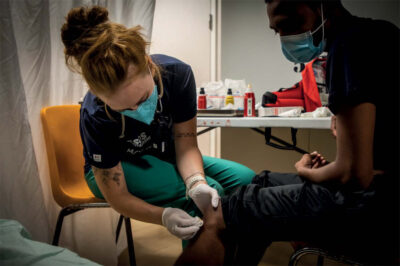Main content
Initially had a very different column in mind. As the title, I intended to use the green capital letters on the white OR board of the now-destroyed Al Awda Hospital in Gaza: “We did all we could. Remember us.” Then, with the remaining 450 words we are allotted as columnists, I would list the names of all our murdered colleagues. First name, surname, and specialty. Until my words would run out, fully aware that the list would be nowhere near complete.
It would have been a gesture of solidarity, a tribute to the plea on the OR board in that surgical theatre and an attempt to transform the anonymous figures that flash across our screens into individuals again. It would have also been a call to action: for us, as medics, to speak out and to hold our governments to account. But I would have also chosen this unconventional format simply because I found myself at a loss for words. Every superlative describing the complete collapse of Gaza’s healthcare system had already been used.
I never dared write that column. Friends warned me it was too politically charged and might undermine my neutrality as a doctor.
It got me thinking about our role as physicians in political discourse. This debate is not new. The eminent physician, pathologist, anthropologist, and politician Rudolf Virchow said it in 1848 already: “Politics is nothing else but medicine on a large scale.” His words highlight a fundamental principle of public health: that illness and wellbeing reflect the successes and failures of society as a whole. Promoting health therefore demands political engagement. Virchow’s convictions led to his dismissal from Berlin’s Charité Hospital in 1849.
Yet he continued to advocate for safe drinking water and sanitation, for new hospitals, for childhood vaccinations, and for gymnastics classes for girls.
I am proud we have our own Virchows here in The Netherlands: fellow medical professionals who campaign against poverty, the tobacco lobby, loss of biodiversity, the food industry, and racism, for example. It takes courage, as political involvement by doctors has always evoked controversy. In the United States, for instance, medics were admonished to stick to their expertise when they spoke out against mounting gun violence and political gridlock over firearm regulation in 2018. “Stay in your lane,” they were told.
In response, they launched the #thisismylane campaign, encouraging healthcare workers to speak up—even outside the traditional realm of medicine. I wholeheartedly join them, now more than ever. The entire population of Gaza is ill. We urgently need political action to help them heal.
This column was previously published in Ned Tijdschr. Geneeskd. 2024; 168:B2313 (28 March 2024).



















































